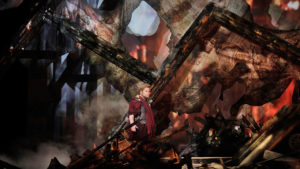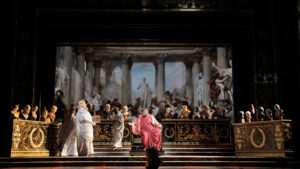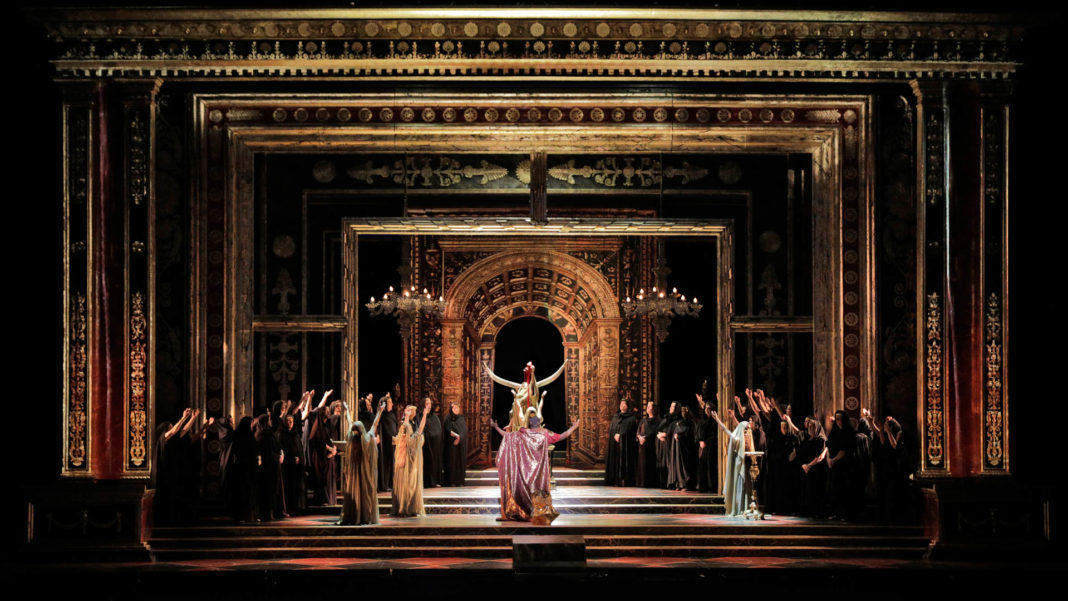It’s safe to say that The Clemency of Titus is not the best-known of Mozart’s operas. Written around the time he was working on The Magic Flute and the Requiem, this opera was a commission and has been judged, fairly or not, as a lesser accomplishment. But that’s not the view of director/designer Thaddeus Strassberger who is helming a brand new production of the work for LA Opera. His production of The Clemency of Titus opens on Saturday at the Dorothy Chandler Pavilion for a run that concludes on March 24th.

Strassberger’s work was most recently seen with LA Opera’s production of Nabucco. In addition to his work here, Strassberger regularly directs and designs productions around the world. He’s created critically-acclaimed and highly visual productions of such operas as Hamlet, Don Giovanni, The Marriage of Figaro and more. (For the curious, you should see his website for images)
Set in Rome at A.D. 79, it is a story of politics, revenge, forgiveness and love. Russell Thomas stars as Titus. He is best-known locally for having played the title character in a concert production of Verdi’s Otello at the Hollywood Bowl last year.
I recently spoke with Strassberger about the lack of love for this opera, its contemporary relevance and the perspective he received from Supreme Court Justice Ruth Bader Ginsburg.
The Clemency of Titus is neither well-known or necessarily beloved. What pressure do you feel in having to win over primarily newcomers who are experiencing this work for the first time?

I actually think it is an advantage. You are starting off with a blank slate. You aren’t confronting what they thought it was versus what it is. I hope they don’t do too much research on this before seeing it. It’s interesting with classical music that they have to be well-prepared in order to understand something. Whereas other forms of audio/visual art you wouldn’t read about it.
Clemency is not Mozart’s most notable opera. What drew you to a work that has been referred to as unmemorable and a step backward for the composer?
I think taste is always a really strange thing. If we could figure out what causes the people’s taste to change we’d all be millionaires. What’s interesting to me is it’s one of his later works. He was developed as an artist. When it was commissioned he wasn’t asked to write a masterpiece that would last centuries. He was asked to write something to accompany the coronation of a new king. It does have ideas that continue to resonate. Anyone with a huge output like Mozart, it can seem like a lesser work. If you look at it overall, it does contribute to our understanding of what Mozart thought.
In the video created by LA Opera about this production, you talk about darkness, vengeance and getting people back into an enlightened world with ideas, poetry and art. Though opera schedules are put together many years in advance, you must be excited by how timely those themes are in America today?
Well you kind of wish they weren’t. But that’s the point of these classic dramas which are drawn on ancient Roman ideas that have been around for a long time. And we have to repeat them because we never learn the lessons. I think we could do this all the time and it would be on point in a way.
Does the line between fiction and reality get blurred in this production?

I would say it is a common opera trope based on historical fiction. A lot of the characters and dates and timelines add up to facts. But the human flesh love stories, which were not recorded by historians, is there. You have a love story that gets enmeshed with the historical.
You told the website bachtrack that you first thought about Clemency 20 years ago while studying at La Scala. Now that you get to direct and design the opera, do your ideas stem from your first thoughts two decades ago or are they mixed with new ideas based on the times in which we live?
They evolve all the time. That’s the terrifying thing for a director to do – you have to edit all the ideas you have in your mind. I spend a lot of time in Rome. Even in the 20 years since I’ve been thinking about Clemency there’s more excavation that adds to your understanding of the city. There’s a narcissistic idea of modern times that [people then] are exactly like we are. People are ringing their hands about politicians. There are superficial things we can do to move our lives to be more, I don’t like the word tolerant because it sounds like you still have a grudge and allow things to happen, but in small ways we can find examples that are short-lived that can move things at a cosmic pace.
Mozart said, “I pay no attention whatsoever to anybody’s praise or blame. I simply follow my own feelings.” Is that your approach? Is he correct or is it that impractical?

That is ultimately what an artist strives to do. I did a production of Hamlet with big questions at the Kennedy Center. My Hamlet is set in the Soviet Bloc world. At the opening night dinner I was sitting next to Justice Ruth Bader Ginsburg. She was asking me how I came up with my concepts. “I do all this research and I pull on things I’ve known for 20 years. I seek out new things and meet experts. In the end I have to take all this information and distill it down. I’m making these decisions that can last for a year or two or two.” I said, “The decisions you are making can impact people’s lives for a lifetime.” She said, “No, it’s exactly the same. You read, you write and then you go right into your heart and figure out the right thing to do.” She has people with opinions around her; just as there is in opera. But in the end you want to shoot right down the middle and stay true to yourself and by the end you have to stay true to yourself.
Production Photos of “The Clemency of Titus” by Cory Weaver/Courtesy of LA Opera











